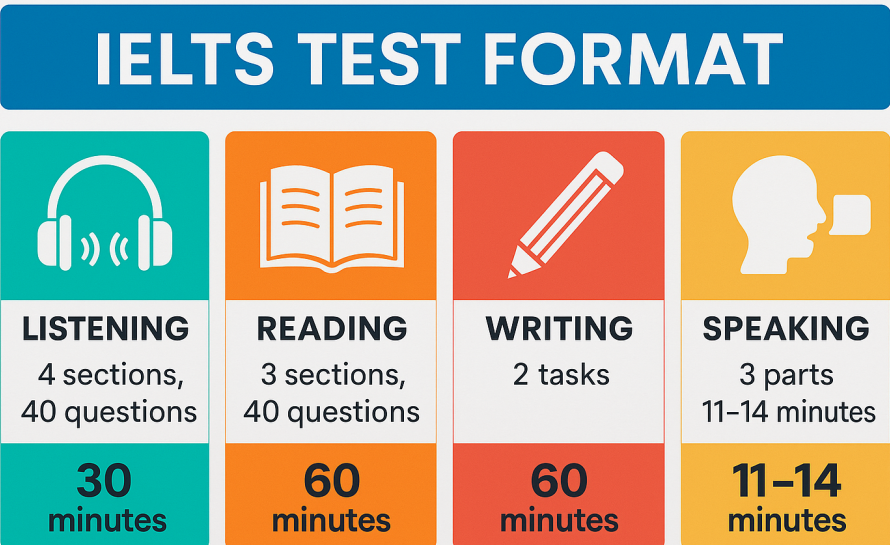
Why should you read this?
If you’re short on time but big on goals, this guide is for you. Whether you need IELTS for study, work, or migration, this article will give you a focused, proven strategy to boost your score in just 1 month. No fluff. No overwhelm. Just a smart, doable plan that gets results.
⏱️ You don’t need forever—you just need 30 days of purpose-driven prep. Here’s how.
📚 Week-by-Week Study Plan: Your IELTS Power Blueprint
🧠 Think of this as your personal boot camp—smart, structured, and laser-focused.
🔍 1. Know the Game Before You Play
Value: Understanding the format builds confidence and reduces panic.
- Learn the structure of each IELTS section (Listening, Reading, Writing, Speaking)
- Know how much time you get, what tasks to expect, and how scores are calculated
- Familiarity = less stress, better performance

📆 2. Follow the 4-Week Power Plan
Value: Simplifies your prep and builds consistent progress.
Week 1 – Listening + Reading
Week 2 – Writing
Week 3 – Speaking
Week 4 – Full mock tests + review
🔁 Tip: Study 3–4 hours a day with short breaks. Consistency > Cramming.
📝 3. Practice With Real Materials
Value: Builds test-taking instincts and timing.
- Use real IELTS past papers or trusted platforms like Cambridge or British Council
- Simulate real exam conditions once a week
- Track your performance and review mistakes
🧠 4. Grow Your Vocabulary by Topic
Value: Boosts both writing and speaking scores fast.
- Study vocab themes: health, education, environment, technology, etc.
- Learn 5–10 new words daily: definition + example sentence
- Use new words in your practice essays and speaking answers

🎧 5. Watch English Like It’s Your Job
Value: Improves listening skills passively and enjoyably.
- Watch English content daily: news, YouTube, Netflix, podcasts
- Focus on IELTS-relevant accents (British, Canadian, Australian)
- Note down phrases or idioms you hear often
🎥 Watch Ted Talks
⏱️ 6. Train with a Timer
Value: Develops speed + structure for the Writing test.
- Alternate days: write one Task 1 and one Task 2
- Set the real-time limit (20 mins for Task 1, 40 mins for Task 2)
- Focus on clarity, structure, and coherence—not big words

🗣️ 7. Speak English Every Day (Yes, Even to Yourself)
Value: Builds fluency, confidence, and spontaneity.
- Answer IELTS Speaking questions aloud
- Record yourself, then review and improve
- If no partner? Talk to your mirror. Out loud.
💡 Pro Tip: Fluency grows with frequency. Speak daily.
🎥 Watch a Band 8+ IELTS Speaking Test
Here’s what high-level fluency looks like. Pay attention to how the speaker expands ideas, uses linking phrases, and stays calm and natural. Try shadowing their answers or mimicking their intonation for bonus practice.
✅ 8. Know What the Examiners Want
Value: Helps you hit the exact scoring targets.
- Read the IELTS band descriptors for each section
- In Writing: focus on Task Response, Coherence, Grammar, and Vocabulary
- In Speaking: aim for Fluency, Accuracy, and Pronunciation

🧑🏫 9. Get Feedback or Coaching
Value: Fixes blind spots and speeds up improvement.
- If stuck, consider joining a 4-week crash course or hiring a tutor
- Even one good piece of feedback can change your score
- Don’t guess—get guidance
😴 10. Sleep, Rest, and Don’t Overthink It
Value: Keeps your brain fresh and focused.
- Avoid all-nighters—rest improves memory and clarity
- Take breaks, stretch, stay hydrated
- A calm mind performs best under pressure
💡 Pro Tip: Study hard. But rest smart.

The 30-day IELTS preparation strategy presented here strikes a great balance between intensity and structure. It offers a realistic yet ambitious timeline that could truly motivate focused learners. What stands out is how it avoids generic advice and instead provides a clear sense of direction, which can be incredibly reassuring for test-takers who feel overwhelmed. The step-by-step progression builds both confidence and skill without overloading the learner, making this approach feel achievable even for those who doubt their readiness. It promotes consistency over cramming, which is essential for long-term retention and performance under pressure.